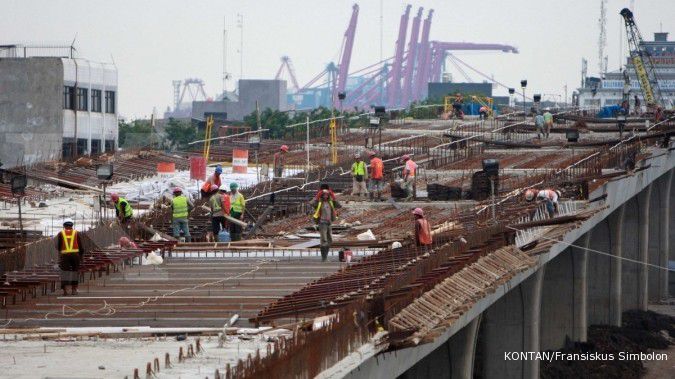JAKARTA. Blaming bleak global economic prospects, Finance Minister Agus Martowardojo has thrown in the towel on the government’s ambitious economic targets for this year.
Speaking before members of the House of Representatives’ Commission XI for financial affairs on Monday, Agus expressed his pessimism over economic growth, the rupiah exchange rate and global oil prices.
Agus, a reform-minded minister, argued that Indonesia’s economy might only expand by 6.6 percent this year, versus the initial forecast of 6.8 percent as stated in the 2013 State Budget Law.
The remark is Agus’ first acknowledgement of the difficulties in meeting the highest target ever set by the government. He previously estimated that the economy grew by 6.3 percent last year, lower than the target of 6.5 percent.
“It’s because of the effects of the prevailing global crisis, especially the problems stemming from [the debt crisis in] Europe and the unsolved fiscal cliff discussions in the United States, which will impact on our economy,” Agus said.
A more worrying sign for the economy is Agus’ forecast that the rupiah might trade as low as 9,700 per US dollar this year.
This estimate is weaker than that stipulated in the 2013 state budget, which requires the currency to trade at an average of 9,300 to the greenback.
The rupiah, already the region’s worst performer, dropped by 5.9 percent against the dollar last year over concerns about a widening trade deficit that may continue this year on higher imports of oil.
Agus warned that oil imports would increase this year, and energy subsidies would rise well beyond the allocated sum of Rp 274.7 trillion (US$28.6 billion). In 2012, energy subsidies hit Rp 306 trillion, or equal to 87 percent of non-tax revenue, up from around 54 percent in 2007.
Oil output is also set to average 850,000 barrels of oil per day (bpd) from the 900,000 bpd initially
targeted.
Agus also forecast that the Indonesian crude price (ICP), an important variable that determines the country’s income and expenses from oil, would hover at between $100 to $109 per barrel, substantially higher than the initial assumption of $100.
“Some of the macroeconomic assumptions, admittedly, are different [from the recent economic developments],” Agus added.
Bank Indonesia (BI) Governor Darmin Nasution agreed that the economy still faced challenges stemming from the prevailing uncertainties in the global economy.
Given the difficult challenges going forward, he called for an adjustment in the price of subsidized fuel by raising fuel prices.
Darmin argued that the economy was heavily burdened by the soaring fuel subsidies that would limit the government’s capacity to respond to external risks.
“Soaring consumption of subsidized fuel will prompt negative sentiment about our fiscal sustainability, consequently adding to pressure on the rupiah,” Darmin said.
President Susilo Bambang Yudhoyono has refrained from raising fuel prices over concerns about the political fallout, particularly ahead of the 2014 elections.
Lawmakers who attended the meeting were baffled as to how the 2013 assumptions could face revision so soon, given the fact that they were only passed in October.
The possible revisions to the state budget, especially with regard to the rupiah and economic growth, showed that the government was in “panic mode” while responding to the recent issues of currency depreciation and trade deficit, said Commission XI member Arif Budimanta.
“What the market needs is confidence and optimism from the government, not the opposite. The government’s stance on the issue could erode market confidence,” he said.
The impending revision of the financial indicators has confirmed arguments expressed by various analysts about the ambitious targets that would be difficult to achieve.
“This will undermine the government’s credibility among the public,” A. Prasetyantoko, an economist from Atma Jaya Catholic University, said. “The government will face difficulties if it wants to undertake unpopular policies, such as increasing the price of subsidized fuel, as the public already has doubts regarding the credibility of the government’s assumptions.” (The Jakarta Post)
/2013/01/07/1482996820.jpg)











